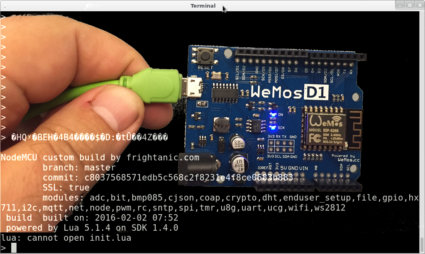 I just got a trio of WeMos D1 R2 boards from Banggood this morning. I haven’t had a chance to do anything with them yet, other than power one of them on and check it for basic function, but I thought I’d give a brief review.
I just got a trio of WeMos D1 R2 boards from Banggood this morning. I haven’t had a chance to do anything with them yet, other than power one of them on and check it for basic function, but I thought I’d give a brief review.
For those of you who maybe haven’t been tracking the ESP8266 based boards, they are basically a small 32 bit processor which run at 80Mhz and include WiFi. What’s really astonishing is how cheap they are: simple ESP-01 boards are available for around $3. These super cheap boards don’t have a lot of expansion pins, and are a little bit of a hassle to program though, since you’ll need a FTDI or similar serial cable.
The WeMos D1 R2 takes one of these modules (the tin package to the right) and mounts it with all the necessary interface logic to interface to USB. When I plugged it into my linux box, the following messages showed up in the output to “dmesg”, indicating that it had connected it to the serial port ttyUSB0:
[48095.058498] usb 1-3.3: new full-speed USB device number 7 using ehci-pci [48095.186475] usb 1-3.3: New USB device found, idVendor=1a86, idProduct=7523 [48095.186482] usb 1-3.3: New USB device strings: Mfr=0, Product=2, SerialNumber=0 [48095.186485] usb 1-3.3: Product: USB2.0-Serial [48095.191571] ch341 1-3.3:1.0: ch341-uart converter detected [48095.251692] usb 1-3.3: ch341-uart converter now attached to ttyUSB0
Then, I ran “sudo screen /dev/ttyUSB0” and connected to it. It was booted into a custom build of the “nodemcu” firmware, which runs the open source language “lua”. You can read the documentation and figure out how to access many of the peripherals and libraries.
The quality of the boards seems quite high. One thing to note is that while the pin layouts and physical form factor of the boards is identical to the Arduino, the ESP8266 board supports much fewer pins. There appears to only be a single analog input, and the labeling of the digital “D” pins are somewhat odd, and it appears that multiple pins may be connected to the same input. It also appears that there are a different set of labels on the bottom of the board, which is truly confusing.
I’ll dig in a bit more when I have some time and figure out what the deal is.
Here is the link to the Banggood page for them. I found a 15% off coupon code “BG15%OFF” using the Honey Chrome plugin, so the cost for three shipped was about $16.